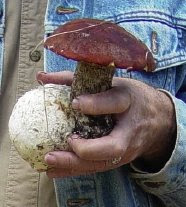
Hawk's wing mushroom, king bolete mushroom, Samsung mobile phone, Garmin Gecko GPS unit, San Isabel National Forest map, topographic map.
Global Positioning System units, says Arizona writer Mary Sojourner, pollute the outdoor experience. Reacting against a High County News piece on geocaching, she explodes:
Here, in the increasingly mapped, sanitized and sold Southwest, geocaching is on a par with surveying. Some of those nasty zealot mesquite-huggers have been known to yank geocaches as gleefully as they once did stakes festooned with Day-Glo plastic.
So that is one argument against carrying a GPS unit: that they turn the self-created nonhuman world into just an outdoor gym -- the kind used by Spandex-clad athletes who run to the top of a fourteener, pausing only to check their elapsed times and heart rates on various digital gadgets.
Gadgets can cause you be less observant, less present, less aware, less involved.
With map and compass, you at least must learn relationships, a basic geometry of azimuth and distance. Or you can rely soley on GPS and end up like this.
Walking along staring at your GPS unit just feels wrong to me. You don't learn anything about the county by doing that -- instead, you need to be looking around (including back the way you came), thinking how this road runs in relation to that drainage, how there is less kinnikinick here and more vaccinium, how a hermit thrush is calling somewhere up the ridge ...
At the same time, I will admit that I own one. I can justify setting a couple of waypoints when making cross-country walks in thick forests with few landmarks. But then I always try to test myself against the GPS as well.
Its compass readings are good, but I have gotten drastically different distance readings when walking the same trail twice. Altitude readings can vary as well -- who knew the Earth's crust was so elastic?
And the biggest barrier to knowing what is around me is not the gadget but my own buzzing brain.

